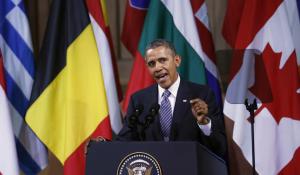By Eugenio Lilli:
In a recent talk I chaired at King’s College London, a prominent American expert on US foreign policy described the crisis in Syria as a ‘no good option crisis’ for the United States.
Similarly, in a February piece on the web magazine War On The Rocks, the authors argued that,
‘With chemical weapons off the table, Assad’s external opposition in disarray, Islamists dominating the insurgency, and an American public unhappy with foreign wars, the Obama administration feels it has few options other than taking steps to prevent the civil war from destabilizing Syria’s neighbours and harming U.S. security.’
There seems to be general agreement in western foreign policy circles about the fact that the complex nature of the Syrian crisis has left the United States with limited leverage to bring the violence to an end. In other words, the United States does want to stop the fighting but international and domestic factors have prevented it from doing so.
What if, instead, Washington was actually benefiting from the protracted confrontation in Syria?
The mainstream debate has not seriously contemplated the possibility that, in fact, the Obama administration has come to the conclusion that the US best option in Syria is to let the confrontation continue. This is not to say that Washington’s concern about the deteriorating humanitarian situation in the country is not sincere. The United States has indeed repeatedly tried, especially through diplomatic means, to stop the ongoing violence. However, both the failure of successive diplomatic initiatives and developments on the ground might have changed the perception of the Syrian crisis in the minds of US officials. Over time, humanitarian concerns might have been superseded by security ones. While blunt, it is a fact that the history of international relations is filled with examples where states’ concerns about the protection of lofty principles were sacrificed on the altar of the pursuit of strategic interests. In this regard, the post-WWII foreign policy of the United States toward the Middle East is a case in point: i.e. the 1953 US/British coup to oust the democratically-elected Iranian Premier Mohammad Mossadeq and replace him with the dictatorial regime of the shah, or the US/Western blind eye to Saddam Hussein’s use of chemical weapons against Iraqi Kurds while Saddam was fighting the Islamic Republic of Iran in the 1980s).
Could the Syrian crisis be yet another example of this trend? And if it is, what US strategic interest would be best served by the continued conflict in the country?
The answer to these questions lies in understanding the contentious relationship between the United States and the actors involved in Syria. Russia, Iran, the Assad regime, Hezbollah, and a variety of Sunni extremist groups (some of them admittedly linked to al Qaeda) represent active parties to the conflict. Prior to the 2011 uprising, these actors were competing in different ways with the United States for influence in the region of the Greater Middle East. President Putin wanted to reassert Russia’s regional power status and have a say in Middle Eastern affairs. Leaders in Tehran clashed with the United States and its local allies to increase Iran’s sway across the region. President Assad and the Shiite party-cum-militia Hezbollah were a continued threat to the security of Israel, ostensibly Washington’s principal Middle Eastern ally. Finally, the profound anti-Americanism of some Sunni extremist groups, especially of those local franchises of al Qaeda such as Jabhat al-Nusra, was not a secret.
The outbreak of the Syrian uprising markedly changed these regional dynamics. While none of the aforementioned actors has ceased to represent a challenge to US influence in the Greater Middle East, the relations among such actors have been significantly affected. Before 2011, Russia, Iran, the Assad regime, Hezbollah, and Sunni extremist groups were by no means allies and were not part of a united anti-US front, however, they were not at war with one another. Today, after three years of bloody confrontations in Syria, a clear divide exists among those fighting on the side of the Assad government and those fighting against it.
On the one side, Russian and Iranian open support for the Syrian regime against a mostly Sunni uprising has tarnished the two countries’ image in the eyes of Sunni Arab communities. The Assad government and Hezbollah’s violent repression of the Syrian uprising has come at the expense of their reputation as regional defenders of all Arabs against US and Israeli oppression. On the other side, Sunni extremist groups are now avowed enemies of the pro-Assad camp that they now perceive as being an anti-Sunni camp. Sunni Hamas, for example, broke its ties with the regime in Damascus in February 2012, while the Sunni, al Qaeda-linked Abdullah Azzam Brigades has claimed responsibility for a number of recent attacks against Iranian targets in Lebanon. Significantly, for the purpose of this article, it is important to notice that the Syrian civil war has also resulted in profound fissures among different Sunni groups within the anti-Assad opposition, especially between the more extremist Islamic State in Iraq and Syria (ISIS) and the relatively more moderate Islamic Front (IF).
In other words, developments in Syria have significantly diverted these actors’ attention from challenging the United States to fighting among themselves. The Obama administration might have reasoned that the old Roman strategy of the divide et impera could well apply to the current Syrian crisis and eventually benefit the United States. In fact, whatever the future outcome of the crisis, the sharp polarization of the actors involved in the Syrian conflict has weakened their regional influence. This is not only due to the high human, economic, and political costs of sustaining the war but perhaps primarily to the effects that the protracted crisis has on their image and legitimacy across the Arab world.
______________________
Eugenio Lilli is a PhD Candidate at the Defence Studies Department, King’s College London. His research focuses on US foreign policy toward the Greater Middle East, in particular on the Obama administration’s response to the Arab Awakening. Eugenio is also the founding chairperson of the King’s College London US Foreign Policy Research Group.


